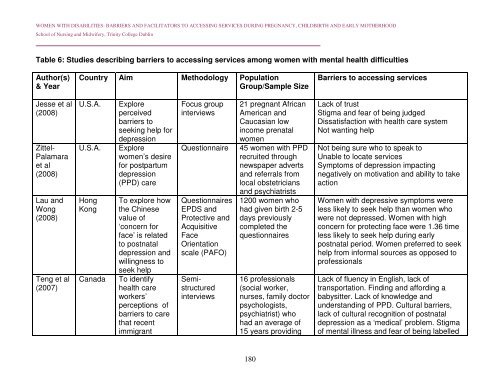Women with Disabilities: Barriers and Facilitators to Accessing ...
Women with Disabilities: Barriers and Facilitators to Accessing ...
Women with Disabilities: Barriers and Facilitators to Accessing ...
Create successful ePaper yourself
Turn your PDF publications into a flip-book with our unique Google optimized e-Paper software.
WOMEN WITH DISABILITIES: BARRIERS AND FACILITATORS TO ACCESSING SERVICES DURING PREGNANCY, CHILDBIRTH AND EARLY MOTHERHOODSchool of Nursing <strong>and</strong> Midwifery, Trinity College DublinTable 6: Studies describing barriers <strong>to</strong> accessing services among women <strong>with</strong> mental health difficultiesAuthor(s)& YearCountry Aim Methodology PopulationGroup/Sample Size<strong>Barriers</strong> <strong>to</strong> accessing servicesJesse et al(2008)Zittel-Palamaraet al(2008)Lau <strong>and</strong>Wong(2008)Teng et al(2007)U.S.A.U.S.A.HongKongCanadaExploreperceivedbarriers <strong>to</strong>seeking help fordepressionExplorewomen’s desirefor postpartumdepression(PPD) careTo explore howthe Chinesevalue of‘concern forface’ is related<strong>to</strong> postnataldepression <strong>and</strong>willingness <strong>to</strong>seek helpTo identifyhealth careworkers’perceptions ofbarriers <strong>to</strong> carethat recentimmigrantFocus groupinterviewsQuestionnaireQuestionnairesEPDS <strong>and</strong>Protective <strong>and</strong>AcquisitiveFaceOrientationscale (PAFO)Semistructuredinterviews21 pregnant AfricanAmerican <strong>and</strong>Caucasian lowincome prenatalwomen45 women <strong>with</strong> PPDrecruited throughnewspaper adverts<strong>and</strong> referrals fromlocal obstetricians<strong>and</strong> psychiatrists1200 women whohad given birth 2-5days previouslycompleted thequestionnaires16 professionals(social worker,nurses, family doc<strong>to</strong>rpsychologists,psychiatrist) whohad an average of15 years providingLack of trustStigma <strong>and</strong> fear of being judgedDissatisfaction <strong>with</strong> health care systemNot wanting helpNot being sure who <strong>to</strong> speak <strong>to</strong>Unable <strong>to</strong> locate servicesSymp<strong>to</strong>ms of depression impactingnegatively on motivation <strong>and</strong> ability <strong>to</strong> takeaction<strong>Women</strong> <strong>with</strong> depressive symp<strong>to</strong>ms wereless likely <strong>to</strong> seek help than women whowere not depressed. <strong>Women</strong> <strong>with</strong> highconcern for protecting face were 1.36 timeless likely <strong>to</strong> seek help during earlypostnatal period. <strong>Women</strong> preferred <strong>to</strong> seekhelp from informal sources as opposed <strong>to</strong>professionalsLack of fluency in English, lack oftransportation. Finding <strong>and</strong> affording ababysitter. Lack of knowledge <strong>and</strong>underst<strong>and</strong>ing of PPD. Cultural barriers,lack of cultural recognition of postnataldepression as a ‘medical’ problem. Stigmaof mental illness <strong>and</strong> fear of being labelled180
















